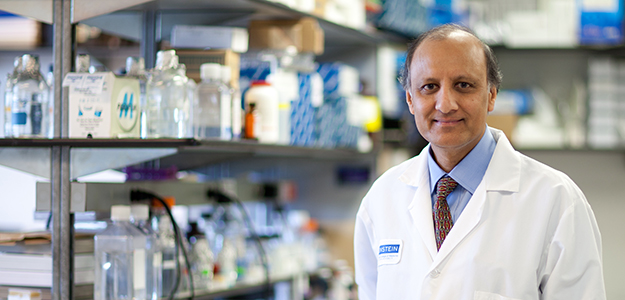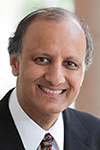 The University of Arizona Department of Medicine will host Sanjeev Gupta, MBBS, MD, FRCP, FACP, FAASLD, from the Albert Einstein College of Medicine in the Bronx, N.Y., for a special guest lecture on Aug. 29, 4-5 p.m., as a candidate for the directorship of the UA Thomas D. Boyer Liver Institute.
The University of Arizona Department of Medicine will host Sanjeev Gupta, MBBS, MD, FRCP, FACP, FAASLD, from the Albert Einstein College of Medicine in the Bronx, N.Y., for a special guest lecture on Aug. 29, 4-5 p.m., as a candidate for the directorship of the UA Thomas D. Boyer Liver Institute.
His talk on “Cellular and Molecular Mechanisms of Liver Regeneration” will take place in Room 8403 (Chase Auditorium) at the UA College of Medicine – Tucson.
Research interests for Dr. Gupta—whose titles include professor of medicine and pathology; the Eleazar and Feige Reicher Chair in Translational Medicine; director, Translational Technologies and Resources, Institute for Clinical and Translational Research; director, Special Animal Core, Marion Bessin Liver Research Center, and associate director, Center for Human Embryonic Stem Cells—include stem cell research, cell therapy and gene therapy as they relate to liver diseases.
To view Dr. Gupta's presentation, click below:
Watch It LIVE!
(or archived here for later viewing)
![]() View and share the flyer for this event [PDF].
View and share the flyer for this event [PDF].
Add this event to your personal schedule (via iCal, Outlook, Google or Yahoo! calendar).
At the Cutting Edge
 “Dr. Gupta is a very prominent and well-established hepatologist who is focused on liver regeneration, stem cells and development of an artificial liver that can help patients waiting for a liver transplant,” said Juanita Merchant, MD, PhD, chief of the UA Division of Gastroenterology and Hepatology.
“Dr. Gupta is a very prominent and well-established hepatologist who is focused on liver regeneration, stem cells and development of an artificial liver that can help patients waiting for a liver transplant,” said Juanita Merchant, MD, PhD, chief of the UA Division of Gastroenterology and Hepatology.
“These are patients who would not survive long without a liver. That’s why this area is so very important. He is very well established and has been supported by the National Institutes of Health (NIH) for more than two decades.”
Steve Goldschmid, MD, interim GI chief prior to Dr. Merchant’s arrival in July, a past dean of the UA College of Medicine – Tucson and endoscopy lab director at Banner – University Medical Center Tucson, expanded on Dr. Merchant’s comments.
“Dr. Gupta is at the cutting edge of research to develop an artificial liver for patients who may not be able to wait for a liver transplant and would be replacing Dr. Tom Boyer who was just about the last triple threat left standing in this field—meaning his talent as a researcher, professor and clinician. Not many people can do all three of those as well as he did.”
 Dr. Goldschmid noted that the liver institute’s creation in 2000 with Dr. Boyer as founding director was funded by the Arizona State Legislature in part due to the death from hepatitis of a prominent member. Dr. Gupta and Dr. Boyer, who died in January only months after the institute’s renaming in his honor, were colleagues—with Dr. Gupta contributing a chapter for Zakim & Boyer’s Hepatology, the authoritative textbook of liver disease co-edited by Dr. Boyer with seven editions in print.
Dr. Goldschmid noted that the liver institute’s creation in 2000 with Dr. Boyer as founding director was funded by the Arizona State Legislature in part due to the death from hepatitis of a prominent member. Dr. Gupta and Dr. Boyer, who died in January only months after the institute’s renaming in his honor, were colleagues—with Dr. Gupta contributing a chapter for Zakim & Boyer’s Hepatology, the authoritative textbook of liver disease co-edited by Dr. Boyer with seven editions in print.
Dr. Gupta’s Background
Dr. Gupta is a world leader in liver-directed cell and gene therapy and stem cell biology. He graduated from Sardar Patel Medical College, University of Rajasthan, and trained in internal medicine at the Postgraduate Institute for Medical Education & Research in Chandigarh, India. He then trained in gastroenterology at Hammersmith Hospital and the Royal Postgraduate Medical School, University of London, and in hepatology at the University of Southern California School of Medicine. He joined the faculty of Einstein in 1987, became a full professor in 1998, and was later named the Eleazar and Feige Reicher Chair in Translational Medicine.
 The scope of Dr. Gupta’s cell therapy efforts is wide-ranging, including genetic diseases, blood disorders, liver failure and chronic hepatitis, and is aimed now at clinical trials. He has numerous fundamental discoveries to his credit, including mechanisms for how the liver can be repopulated with transplanted cells; correction of diseases by cell and gene therapy; the therapeutic potential of stem cells; and pathophysiological mechanisms in genetic and acquired diseases. His work contributed in the 1990s to the first clinical trial in familial hypercholesterolemia of cell/gene therapy. Subsequently, Dr. Gupta established in an animal model how Wilson’s disease—an inherited disorder that causes too much copper to accumulate in the organs—may be cured by cell therapy. More recently, Dr. Gupta established that hemophilia A can be cured by transplantation of liver sinusoidal endothelial cells, or by replacement of other cell types. He has identified new mechanisms by which human stem cells can be manipulated to generate liver cells, and defined fundamental ways by which gene expression is regulated in stem cells during differentiation. He has been continuously funded by the NIH for 23 years and his research has been published widely, including in Science, Nature, PNAS, JCI, JBC, Gastroenterology, and Hepatology. He has served on several journals as an editorial board member.
The scope of Dr. Gupta’s cell therapy efforts is wide-ranging, including genetic diseases, blood disorders, liver failure and chronic hepatitis, and is aimed now at clinical trials. He has numerous fundamental discoveries to his credit, including mechanisms for how the liver can be repopulated with transplanted cells; correction of diseases by cell and gene therapy; the therapeutic potential of stem cells; and pathophysiological mechanisms in genetic and acquired diseases. His work contributed in the 1990s to the first clinical trial in familial hypercholesterolemia of cell/gene therapy. Subsequently, Dr. Gupta established in an animal model how Wilson’s disease—an inherited disorder that causes too much copper to accumulate in the organs—may be cured by cell therapy. More recently, Dr. Gupta established that hemophilia A can be cured by transplantation of liver sinusoidal endothelial cells, or by replacement of other cell types. He has identified new mechanisms by which human stem cells can be manipulated to generate liver cells, and defined fundamental ways by which gene expression is regulated in stem cells during differentiation. He has been continuously funded by the NIH for 23 years and his research has been published widely, including in Science, Nature, PNAS, JCI, JBC, Gastroenterology, and Hepatology. He has served on several journals as an editorial board member.
Dr. Gupta’s trainees include more than 30 faculty members, including nine full professors or associate professors in medical schools. He serves as an expert for the NIH, the Department of Veterans’ Affairs, the Department of Defense, Wellcome Trust, and various international bodies. Dr. Gupta has received numerous academic awards, lectured globally at major professional organizations and served as a visiting professor at leading universities worldwide. He has more than 400 peer-reviewed papers, reviews, book chapters and editorials.
ALSO SEE:
“National Colon Cancer Expert Joins UA/Banner as Chief of Gastroenterology” | Posted July 6, 2018
“New Signage for Liver Institute Installed to Recognize Renaming in Dr. Boyer’s Honor” | Posted Jan. 31, 2018
“Celebration of Life for Late Past DOM Chair, UA Liver Institute Founder Dr. Tom Boyer, Jan. 21” | Posted Jan. 15, 2018

